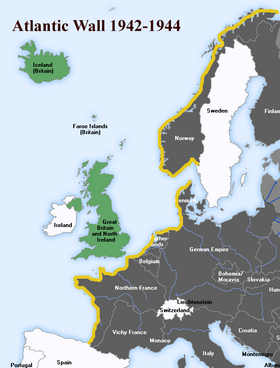Atlantic wall
| Atlantic Wall | |
|---|---|
| Part of the Third Reich | |
| Western coast of Continental Europe and Scandinavia | |

The Atlantic Wall shown in yellow
|
|
| Type | Defensive fortification |
| Site information | |
| Controlled by |
|
| Condition | Partially demolished; mostly intact |
| Site history | |
| Built | 1942–44 |
| Built by | Forced labourers |
| In use | 1942–45 |
| Materials |
|
| Battles/wars | World War II |
| Events |
Operation Neptune Operation Undergo St Nazaire Raid Dieppe Raid |
| Garrison information | |
| Past commanders |
Erwin Rommel (1943–44) |
| Occupants | Wehrmacht |
The Atlantic Wall (German: Atlantikwall) was an extensive system of coastal defence and fortifications built by Nazi Germany between 1942 and 1944 along the coast of continental Europe and Scandinavia as a defence against an anticipated Allied invasion of Nazi-occupied Europe from Great Britain during World War II. The manning and operation of the Atlantic Wall was administratively overseen by the German Army, with some support from Luftwaffe ground forces. The German Navy maintained a separate coastal defense network, organized into a number of sea defense zones.
Hitler ordered the construction of the fortifications in 1942. Almost a million French workers were drafted to build it. The wall was frequently mentioned in Nazi propaganda, where its size and strength were usually exaggerated. The fortifications included colossal coastal guns, batteries, mortars, and artillery, and thousands of German troops were stationed in its defences. When the Allies eventually invaded the Normandy beaches in 1944, most of the defences were stormed within hours. Today, ruins of the wall exist in all of the nations where it was built, although many structures have fallen into the ocean or have been demolished over the years.
World War II in Europe began on 1 September 1939, with Nazi Germany's invasion of Poland. Two days later, the UK and France declared war on Germany. Poland's geographical location, however, prevented the Allies from intervening directly. Four weeks into the attack, the Germans had successfully occupied Poland.
...
Wikipedia
